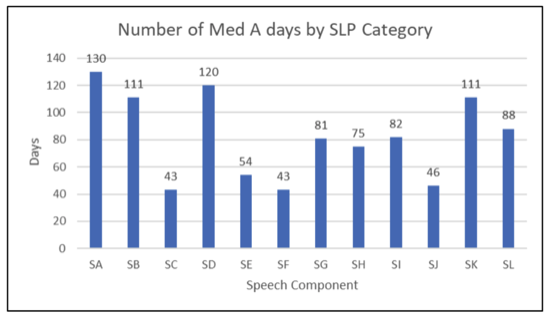Even before the Covid pandemic, skilled nursing facilities were faced with tight operating margins, staffing issues, and reimbursement challenges. Administrators and operators are wise to look at each department and calculate the ROI (return on investment).
The days of being just “happy to have speech therapists” are over, and today we will look at how to measure the ROI on the speech therapy department and see if there is opportunity at your SNF.
Let’s begin by measuring the sources of revenue:
- Revenue from the SLP Component of PDPM – Calculating Medicare Part A revenue from the SLP component is easier than from a RUG. In a PDPM HIPPS code, the speech score is the second letter. For example, if the HIPPS code is MKBD1, then the speech score is “SK.” In Albany, NY, the contribution of an “SK” to the overall PDPM rate is $73.44 per day for each day of the entire Medicare Part A stay, not just when the patient is on program. That’s why it is so important to do a great job on the PDPM SLP Assessment. Add up the speech score for each day multiplied by the number of Part A days, and you will have the total Part A revenue.
- Medicare Part B – A great nursing home speech therapy department should shine right here. They should be well trained and highly proficient in actively seeking long-term care patients suffering from swallowing disorders (dysphagia) or cognitive communicative disorders. Providing speech therapy to one of these patients 5x per week for 3 weeks will typically generate over $1,400 in revenue. Additionally, if placing a patient on a speech therapy program prevents a costly re-hospitalization for aspiration pneumonia, significant savings are realized. Expect to see 20-50% of the speech caseload coming from your LTC population. If you aren’t seeing that, the amount of resources you are dedicating to speech therapy might need to be examined.
- Managed Part A – Check your managed care contracts. It is important to measure the impact of therapy during the Part A stay. If the payor uses Levels, it is probably a nominal amount, but still worth tracking. Have any of your Managed Part A plans switched over to PDPM?
- Managed Part B – How well do your Managed Part B plans pay you for Part B therapy? Dig into those contracts and make sure you aren’t being short-changed. This is a valuable service in which SNFs deserve fair reimbursement.
- Other Revenue – If you have other non-Medicare payors, check to see if they pay additional for providing rehab. Every bit counts.
Now comes the fun part. How much are you actually spending on what you are getting?
If you employ your speech therapist(s), be sure to count ALL of the following costs: Salary, benefits, time off, health insurance, and payroll taxes. Don’t forget the cost of per diem staff that provides coverage while your full-time SLP is on vacation or out sick. This tends to add up quickly.
If you work with a full-service rehab company, are they able to calculate for you the revenue gained from speech therapy versus the cost of the SLP? If you aren’t seeing revenue at a reasonable expense, ask why.
Now, let’s calculate a pro forma to measure the Return on Investment. The following example is from a 200-bed facility in New York State that works with Language Fundamentals.
| Monthly Speech Therapy Pro Forma | ||||||
| Medicare Part A Revenue (from PDPM SLP Component) | $23,600 | |||||
| Medicare Part B Revenue | $7,600 | |||||
| Managed Part A Revenue | $3,200 | |||||
| Managed Part B Revenue | $2,100 | |||||
| Other Revenue | $900 | |||||
|
Less |
||||||
| Speech Therapy Expense | ($14,950) | |||||
| Return on Investment for the month | $22,450 | |||||
As you can see, speech revenue greatly exceeds the expense for the SNF.
Additionally, if your SNF is in a CMI collection period, measure the contribution of speech therapy toward potential CMI pickups. Each potential pickup contributes to the overall CMI.
Language Fundamentals Regional Managers provide continuous oversight of the caseload, PDPM scoring, and documentation review to ensure clinically appropriate care and accurate reimbursement.
Would you like a complementary Speech Therapy Department Analysis for your SNF? It’s easy to begin and provides very useful data. Contact us for details. We would be glad to help.



